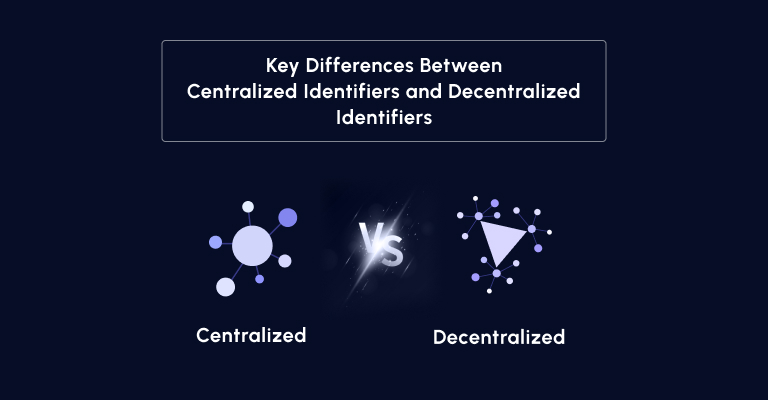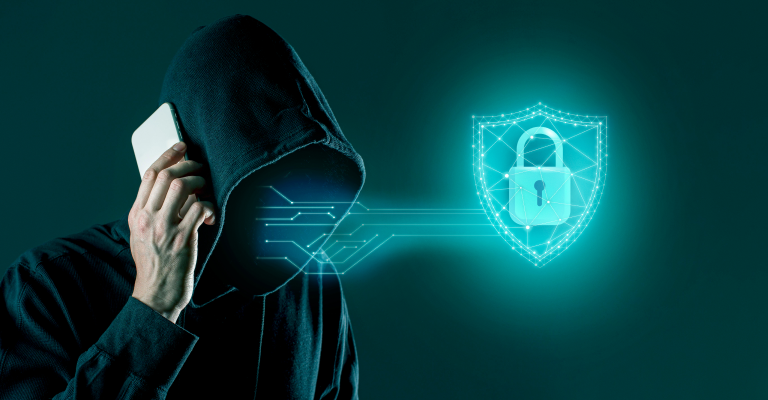Today, when sophisticated cyber-attacks target big companies successfully and as more of our data moves online, the need for secure and user-controlled identity solutions is very critical. Decentralized identity management can solve these issues. The global decentralized identity market is expected to reach $102 billion in the next six years.
Traditionally, identity management has been dominated by centralized systems controlled by single authorities like government or big companies. However, the advent of blockchain technology has supported decentralized identifiers (DIDs) that put users in control of their own identity data. Companies like EveryCRED are at the forefront of this shift, as we provide decentralized identity solutions for businesses and individuals alike.
However, you need to understand the differences between centralized and decentralized identifiers. Here, we have explained how decentralized identifiers differ from centralized identifiers and how they are the future.
Centralized vs. Decentralized Identity Management
Centralized identity management has been the traditional method for handling digital identities. In this setup, a central authority, like a government agency or a big company, is in charge of collecting, storing, and managing people’s personal data. Users have to trust these central authorities to authenticate their identities and give them access to various services and resources.
While decentralized identity management distributes the control and ownership of personal data across a network of devices or participants – No single organization is handling data. Without relying on a single central authority/entity, decentralized identity solutions use blockchain technology and some cryptographic techniques to let people create, manage, and control their own digital identities.
Here are some key differences between centralized and decentralized identity management:
| Topic | Centralized | Decentralized |
| Data Control | Single authority | Individual users |
| Data Storage | Central database | Distributed network |
| Security | Single point of failure | Resilient and tamper-proof |
| Privacy | Limited user control | User-controlled data sharing |
| Interoperability | Challenges due to proprietary standards | Open standards and protocols |
| Trust | Relies on trust in central authority | Establishes trust through cryptographic proofs |
| User Experience | Smooth experience | May require additional steps |
What are Centralized Identifiers?
Centralized identifiers are the traditional approach to digital identity, where a central authority assigns and manages unique identifiers for individuals.
Some common examples include:
- Government-issued IDs like passports, SSN, voting card, and driver’s licenses
- Corporate user accounts managed by a company’s IT department, usernames, and email addresses
- Social media profiles tied to a specific platform
Features of centralized identifiers include:
- Central Authority Assigns Them: Centralized identifiers are issued and managed by a central group, like a government agency or a service provider.
- Limited Portability: Centralized identifiers are often specific to a particular organization or service, making it tough to use them across different platforms or places.
- Middlemen: People have to rely on the central authority to prove their identities and give them access to services or resources.
So, these identifiers are usually stored in a central database and used to prove who you are and what you can access across various systems and services. While centralized identifiers are convenient for organizations, they also have some drawbacks:
- Users have limited control over their own identity data
- Central databases are prime targets for hackers and data breaches
- Having separate identities across different platforms leads to fragmentation and inefficiencies
Check: Why Do We Need Verifiable Credentials? What’s Wrong with Our Current Verification Systems?
What are Decentralized Identifiers?
Decentralized identifiers (DIDs) are a new type of identifier that enables verifiable, decentralized digital identity. DIDs are globally unique, persistent, and can be verified cryptographically, and they don’t depend on a central authority. They are typically associated with a specific entity, such as a person, organization, or device.
So basically, they are:
- Created by individuals or organizations using systems they trust
- Not dependent on any central authority or single point of failure
- Cryptographically verifiable using technologies like digital signatures
Features of decentralized identifiers include:
- Self-Sovereign Identity: DIDs let people have full control over their digital identities and personal data.
- Cryptographical Verification: DIDs are associated with special keys that allow for secure and verifiable authentication and communication.
- Decentralized Storage: DID documents, which contain information about the DID and its associated public keys, are stored on decentralized systems like blockchain networks.
- Interoperable: Open standards like W3C’s DID specification enable broad compatibility.
Examples of decentralized identifier use cases include:
- Secure supply chain management
- Simplified KYC processes for financial institutions
- Issuing blockchain-powered digital certificates
Also Read: 21 Decentralized Identity Examples and Use Cases Transforming Industries
Major Differences Between Centralized and Decentralized Identifiers
While both centralized and decentralized identifiers aim to establish digital identity, they differ in several key aspects:
| Topic | Centralized Identifiers | Decentralized Identifiers |
| Ownership and Control | Owned by central authorities | Owned by people |
| Security | Can get hacked more easily | Better security |
| Privacy | Less privacy | Puts privacy first |
| Moving Around | Hard to move around | Can work across different places |
| Verification | Relies on central authority | People can verify themselves |
| Resilience | Depends on central authority | Resilient and independent |
| User Experience | Might be easier to use | May need some learning |
- Control: Centralized identifiers are owned and controlled by a central authority, while decentralized identifiers are owned and controlled by the people themselves.
- Security: Centralized identifiers are more likely to get hacked or fail, whereas decentralized identifiers offer better security through storing data in multiple places and using math techniques.
- Privacy: Centralized identifiers often make people share more personal info than they need to, which can be a privacy issue. Decentralized identifiers put privacy first by letting people choose what personal data they want to share.
- Moving Around: Centralized identifiers are often tied to specific organizations or services, limiting their ability to move around. Decentralized identifiers are designed to work across different platforms and places.
- Verification: Centralized identifiers rely on the central authority for verification and authentication, while decentralized identifiers let people verify their own identities through math proofs.
- Resilience: Centralized identifiers depend on the central authority to keep working, whereas decentralized identifiers are resilient and can work independently of any single entity.
- User experience: Centralized identifiers might be easier to use, as people are used to them. Decentralized identifiers may need some learning and extra steps for setup and management.
Also Check: 5 Reasons Every Industry Needs Decentralized Credential Issuer for Accreditation
Conclusion
As the world becomes digital, the way we manage and verify identity must evolve. Decentralized identifiers offer an alternative to traditional centralized systems, which empowers users with greater control, privacy, and security.
At EveryCRED, we are committed to advancing the adoption of decentralized identity solutions. Our platform uses blockchain technology and W3C standards to provide businesses and individuals with powerful, user-centric identity management tools. You can contact us to find out how we can help your business.
The future of identity is decentralized, and with solutions like EveryCRED, that future is already here.

 6th September, 2024
6th September, 2024 



